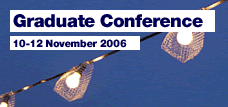
There are many strange perceptions out there about what a CU Staff Worker might do.
I do not do
this [HT:
Fearners] I'm not aware that anyone
does think I do that, but just to set the record straight.
There's nothing like a good communications strategy...
CU member: Who are you?
étrangère:
I'm the new Andy Weatherly, only shorter, blonder, more Northern Irish, and female.CU member: Nothing like Andy then.
étrangère:
Well, no, not really. So why not let the CU members define the job?
CU member: Who are you then?
étrangère:
I'm the CU Staff Worker :-)
CU member: Oh, you're the one who takes them for coffee? [With a nod towards the 2 leaders]
étrangère:
Something like that [2 leaders smile brightly]
Or the university multi-faith centre chaplains?
étrangère:
Hi...Friendly Chaplain: Yes, I know you!
étrangère:
Em, I don't think so...[FC has a moment of insisting he knows me, followed by the realisation that he doesn't. Then...]
FC: Good to meet you - you'll know all about me! [Aside to students:] They get briefed on Chaplains, you see. [Back to me:] Andy will have sent you all my emails!
étrangère:
Er...Well, why don't we see what non-Christians think?
Orchestra member: So what do you do?
étrangère:
I help students study the Bible to check out who Jesus is and what they're going to do about it.[After a while, he calls me back, indicating the lady beside him]
Orchestra member: She's a vicar's wife!
'Vicar's wife': Hi. He says you're 'some sort of Christian' & that you do Bible studies?
Driving instructor: What's your job?
étrangère [concentrating hard and going into 3rd gear]:
I work with students...Driving instructor: We'll be turning right at the next junction
étrangère:
...I help them [check mirrors, signal] investigate the Bible, and [mirrors, slow down] who Jesus is, so [down into 2nd] that they'll trust in him... Driving instructor: SLOW DOWN - how much of the road can you see?
étrangère:
[slow down, take corner]Driving instructor: Well done.
étrangère:
...and know how to follow him.Driving instructor: Ah, ok. ... Well I won't be asking you any more questions as you clearly can't concentrate on the road at the same time.
I gather the explanation doesn't get any easier as time goes on. There's something on it
here, but there's only so much you can...









